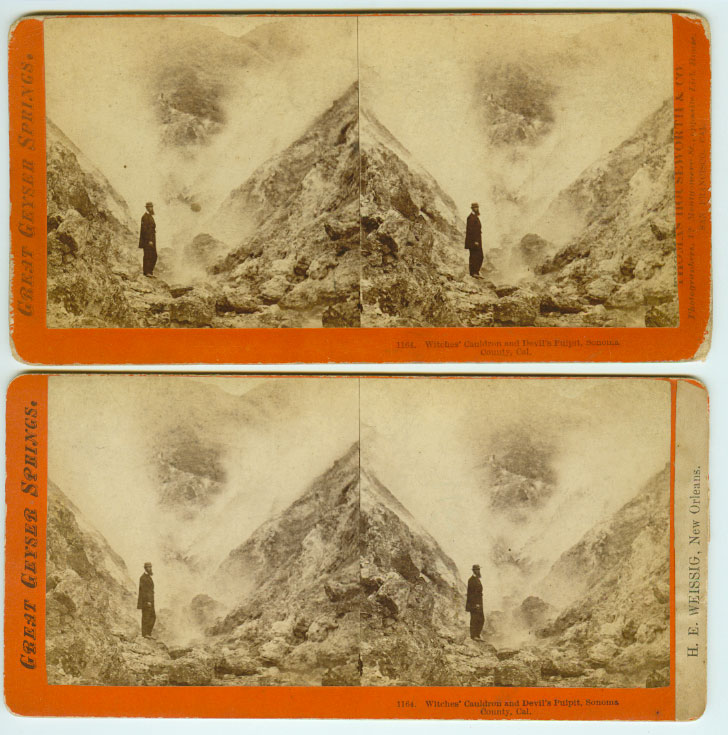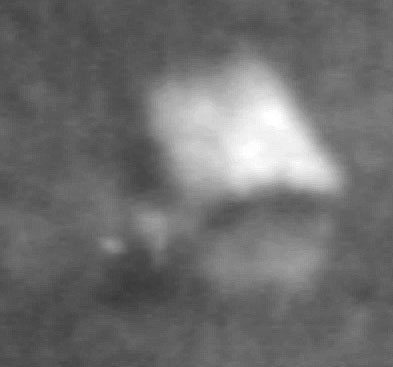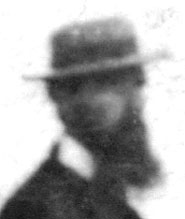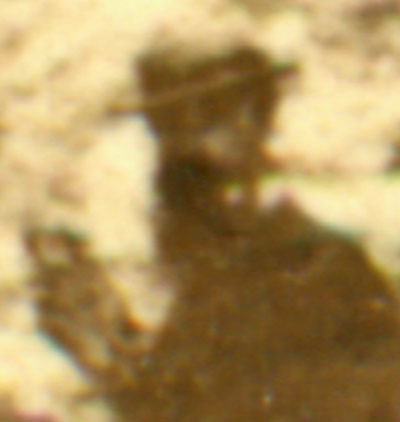
Click to enlarge
I am aware of two copies of a stereoview of a man
standing near the "Witches' Cauldron" at Great Geyser Springs in Sonoma
County, California, circa 1870. The man is nicely dressed and holds
some things in his right hand that appear to be a book and a brush wrapped
in cloth or paper (perhaps a negative carrier or other photographic
apparatus.)

Click to enlarge
I believe the man is Eadweard Muybridge and the photograph
is a self-portrait.
This card is part of a series known to have been sold by
San Francisco photographers Thomas Houseworth & Co., but there is no
particular reason to believe that the photo was actually taken by
Houseworth. Muybridge was one of several who supplied Houseworth and
others with photographs to sell under their own labels. The image on
this card and others in the series are similar in style and physical
aspects to photographs taken by Muybridge at around the same time and sold
under his own name. A well-known portrait of Muybridge was sold by
Houseworth and shows Muybridge sitting on a "Houseworth" crate.

A well known portrait of Muybridge, circa 1872, sold by Houseworth
The two cards are identical except for the name of the
vendor that appears on the right edge. The first card is stamped
"Thomas Houseworth & Co.; Photographers, 12 Montgomery St., opposite Lick
House; San Francisco, Cal." Note that the first few letters of the
stamp are on top of the image.

The second card has a label glued on that says "H.E.
Weissig, New Orleans". There's no trace of the Houseworth stamp on
the card. So it seems the photos were mounted on the orange card
with the heading "Great Geyser Springs" preprinted on the left edge, the
number and title "1164. Witches' Cauldron and Devil's Pulpit, Sonoma
County, Cal." also preprinted. The card was then wholesaled to
various vendors who would stamp or label the card with their name.
It seems to me that Muybridge may have printed and mounted these photos
himself.
Muybridge is known to have often included himself in his
photographs. With the slow plates of the time, he could start the
exposure and then run into the frame, hold still for a while and then run
back to end the exposure. In fact there's another photo from the
series (#1158, see below) that shows a group of people including the same
man as in #1164. He is slightly blurred and underexposed as if he
has just run into the frame; everyone else is sharp as they stood still
for the entire exposure.
Compare the face of the man in #1164 (left) with the
well-known portrait of Muybridge (right) from about the same time:
 
There are several things that make this self-portrait
particularly interesting. First is the fact that it shows Muybridge
at Great Geyser Springs, scene of some of his most famous early photos.
Also interesting is the fact that Muybridge has chosen to photograph
himself standing on the "Devil's Pulpit." It's not the only time he
placed himself in that kind of mythological context: he photographed
himself standing on the edge of a dock in Yosemite and titled it "Charon
at the Ferry."
Here's an enlargement of the face of the man in Houseworth
#1158, holding something (a negative or slide?) in his hand:


Houseworth #1158
Some people have speculated that the person in these
photographs may be the photographer Carleton E. Watkins. There is a
resemblance between Watkins and Muybridge. Although Watkins
photographed the Geysers, he is considered a competitor of Houseworth and
it seems unlikely he would have allowed them to distribute his
photographs. Muybridge, on the other hand, is known to have supplied
images to Houseworth.
###
|